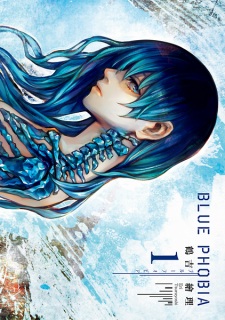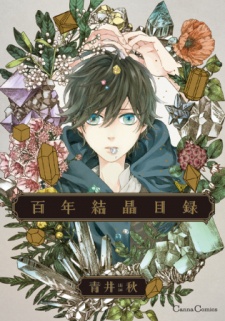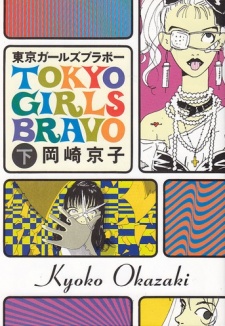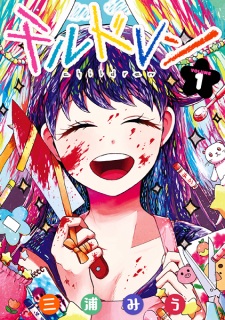Apr 22, 2021
I picked this one up on a whim since the cover was pretty striking and it didn't seem to have that many chapters, so I could read this in a fairly short time. Indeed, I completed Blue Phobia in about an hour or so, and it has definitely left a profound impact.
The story seems pretty simple at the start; humans are exploiting a dangerous energy source which they use to experiment on humans. It's unethical, and so on. The plot isn't especially unique, but the way in which the storyline is executed in the following chapters makes for a really engaging read.
In the
...
art aspect, I can definitely say that the art is, well, fine. It's nothing special, but it's not bad either. Where I think the art really makes a larger impact is (*spoiler*) when Kai and Meer are running from the patient who has been so far gone and infected by blue ore and the patient's body is just a complete mess of flesh, bone, and rot. (It's kind of hard to describe but if you read it you'll see.) The art in that scene very effectively contributes to a certain shock factor that makes this manga, while not a thriller, somewhat more terrifying and urgent, driving you to read on and on. Also, when the patient starts to write the word "Hello" on the glass, it becomes even more shocking to the reader, knowing that the monster that we were seeing was once human and capable of learning, trying to hold on to that last bit of humanity that it had. Just knowing the fact that the monster was something that humanity had created just gave me an epiphany (no joke) about the consequences of human action. I think that the mangaka could possibly be warning us to question our choices and actions, for they may lead to, well, bad things in general. (Or I could just be entirely wrong; it may not even be nearly that philosophical.) Moving on...
The pacing of the story was surprisingly stable and easy to follow, despite by skepticism when I saw that there were only 18 chapters. The action starts off with a bang, so many questions are raised, and all those questions are steadily answered as Kai starts to progressively gain fragments of his memory back. What I thought was really successful in the execution of the plot line was how the explanations behind what was going on wasn't all that overwhelming or complex. However, the conflicted minds and personalities of the characters added a whole other level of complexity that absurd and intricate explanations wouldn't have been able to do otherwise. Sorry if that's literal word vomit but I think an easier explanation would be to compare the ending of Blue Phobia where Kai stays behind on the island, sacrificing himself so that the indigopathy cannot continue, to the ending of the Attack on Titan manga. While AoT is obviously a modern masterpiece and Blue Phobia is just a small, niche manga barely anyone knows about, I still think that comparisons can be made between the two protagonists. While Kai didn't have the time to experience as much character development and growth as Eren did, both men sacrificed their lives for the sake of a larger cause. However, while I personally felt that we had so many questions left unanswered from the ending of the AoT manga, Blue Phobia does a better (but by no means perfect) job of concluding and providing reasoning for the main character's sacrifice.
In terms of characterization of the few main leads we had, I think that the development of Kai as the main character was possibly the manga's finest point but also the most unrealistic point simultaneously. (*spoiler*) We can see how he reacts each time he regains a memory, horrified of the things he has done while experimenting with developing the 1107 drug. It shows, yes, he is human and feels tremendous guilt at what he has done, but at the time he thought what he was doing was for the good of humanity. He also uses this guilt to push him forward to do the right thing and "redeem" himself when he infects himself with the ore to fight Kisui and save Meer. However, towards the end of the story I started to think that his development had become somewhat realistic. Within the span of less than a day (at least I think that's how it was in the manga), (*spoiler*) he suddenly turns from a conflicted being who has realized how all their actions have hurt others to a selfless martyr, sacrificing his hand to power the plane to allow Meer and Fukami to escape while he stays on the island, citing the fact that while he lives the 1107 drug can be exploited by other people wanting to experiment like the researchers on the island. I feel like this rapid change in drive and personality could have been even the slightest bit more believable if the manga had been a little longer and the story was paced slower. Not that the pacing was bad or anything, but it did have a somewhat negative impact on the characters.
What I think is most lacking in this manga is the minor characters. I don't really feel the need to comment much on Meer, Fukami, or Kisui, as I didn't feel like they played much of a role overall since they didn't contribute all that much to the eventual outcome or Kai's development (though Meer did to a small extent). I had a hard time figuring out Fukami's role as a double agent or what is plan was in basically blowing up the island, or Kisui's desire for revenge. While I understand Kisui's motivation for revenge since he was tortured and experimented on by the scientists, why wait so long and have so many of your people suffer just for you to...do what? How was Kisui even planning on taking his revenge? And the fact that he jumps into the vat full of the 1107 decolorization drug is sort of a stretch in the plot. His suicide was merely a pitiful attempt to invoke some sadness and emotion out of the reader to feel sorry for his plight. Needless to say, it failed. And I couldn't really understand what Fukami was really doing there. Like, he wanted to rescue Kai and Meer but then he sent all those papers saying something like "flightless birds are useless" and abandons them? Like what even is his goal anymore? Also, after Meer and Fukami escape the island, what does Fukami even do? Where does he go? Do he and Meer work towards finding a solution to curing indigopathy or stop its extraction altogether? There's just so many questions left unanswered.
Speaking of questions left unanswered, while I do think that it's frustrating that we don't know what happens to the world in the future and how the blue ore experiments will end, I think that by writing on ending like this the mangaka actually succeeds in highlighting a realistic aspect of our lives. After an uprising, struggle, or revolution, we have not won. We still have to keep pushing on to fight for what we believe in. Sometimes the path ahead is not clear and will still have many roadblocks. The struggle of Meer after she leaves the island provides a somewhat unsatisfactory yet very realistic picture of what happens after you overcome a hurdle. It's like, I've met my goal...but what now?
Despite its flaws, where I think Blue Phobia really succeeds is in its commentary on human nature. I think that the scientists being unethical and performing torturous experiments on patients isn't anything that we haven't seen before in manga or anime (like Elfen Lied and Darling in the Franxx), and as a result of that, Blue Phobia lacks some uniqueness in that aspect, which fails to make it as memorable as it could potentially be. However, where the mangaka comments on and gets you to think deeper is when he/she/they (*spoiler kinda*) compare the usage of the blue ore as energy to the invention of the airplane or nuclear weapons. Just as how Fukami (I think it's him?) thought that blue ore could be used to bring peace to the world, the Wright brothers thought the airplane could benefit people as well. However, both inventions were used to take away human lives instead. In this aspect, we as readers are really forced to contemplate how their choices and people's responses to those choices can affect the broader world.
So if you are looking for a shorter, profound yet enjoyable manga to read, Blue Phobia is the one for you. :)
Reviewer’s Rating: 8
What did you think of this review?
Nice
 0
0
Love it
 0
0
Funny
 0
0
Confusing
 0
0
Well-written
 0
0
Creative
 0
0Show all

























